






Reading Time




READING TIME




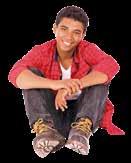
La storia a fumetti di ANNE OF GREEN GABLES per scoprire il piacere dell’ascolto e della lettura con attività di consolidamento orali e scritte
COMMUNICATION KIT
e aree lessicali per ripassare funzioni linguistiche e vocaboli in contesti ludici
Attività di comprensione e produzione orale e scritta
GRAMMAR KIT
Regole ed esercizi di consolidamento grammaticale
FUN KIT
Giochi linguistici e attività ludiche per consolidare il lessico
TOWARDS INVALSI / FINAL EXAM
Attività di lettura (Reading) e ascolto (Listening) per prepararsi alla Prova Invalsi e all’Esame di Stato

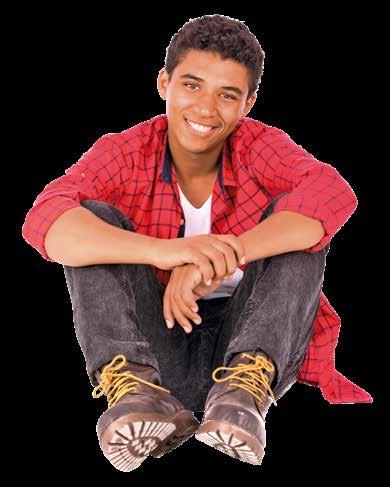
HANDY GRAMMAR 2
Un piccolo manuale dove approfondire
grammaticali con schemi ed esempi in carattere ad alta leggibilità.








Conoscere gli obiettivi dell’Agenda 2030 per un futuro sostenibile
Gruppo Editoriale ELi le tematiche legate all’Agenda 2030 vengono affrontate in modo coinvolgente e costruttivo, attraverso testi, attività, video e immagini volti a sensibilizzare la classe a una comprensione più attenta e critica di ciò che succede nel mondo.
L’attenzione alle competenze, cognitive e non cognitive (soft skills), completa il nostro impegno nella formazione di cittadine e cittadini consapevoli e responsabili di uno sviluppo sostenibile.
Il nostro impegno per l’inclusione, le diversità e la parità di genere
Gruppo Editoriale ELi in collaborazione con il Dipartimento di Studi Umanistici dell’Università di Macerata ha creato un programma di ricerca costante mirato all’eliminazione degli stereotipi all’interno delle proprie pubblicazioni.
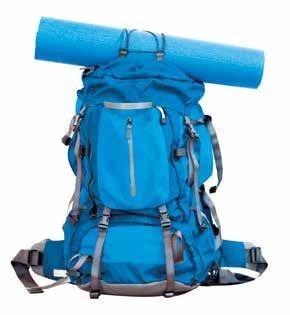
Guarda e ascolta sullo smartphone o sul tablet tutti i contenuti multimediali del tuo libro con la App Librarsi



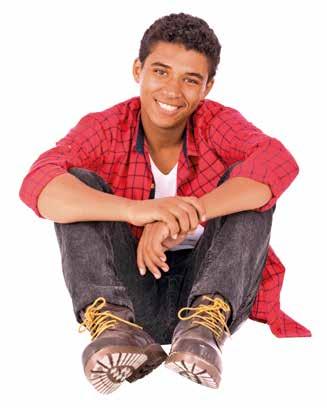

Scarica la App da App Store per iOS e su Google Play per Android.

Inquadra la pagina del tuo libro.



Accedi ai contenuti e scaricali.
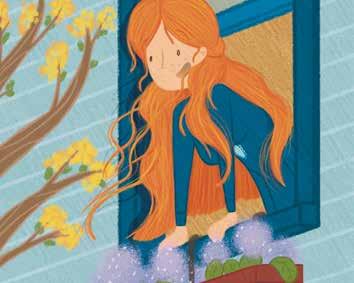
What’s your personality? What animal type are you?
Descrivere la personalità
Scoprire aspetti della propria personalità page 22 2
Jobs
Hobbies and volunteering
Parlare di eventi programmati
Dire e chiedere la professione page 28
Shops and other places
All over Australia
Raccontare eventi al passato
Orientarsi in città
Moving around
How do I get there?
Esprimere obblighi o divieti
34
Chiedere e dare informazioni stradali
40
Endangered animals
The aardvark, this funny animal!
Descrivere un animale
Spiegare il perché
dell’estinzione di alcuni animali page 46
From hurricanes to medicanes
Raccontare al passato
Parlare del tempo atmosferico
52
Health
Healthy
Parlare di disturbi fisici
Dare
o suggerimenti
Let’s revise!
• Present Simple
• Present Continuous
• Present Continuous con significato di futuro
page 25 A VERY SPECIAL MUM!
• Past Simple
• Past Simple di BE e HAVE
• Past Simple – Forma affermativa dei verbi regolari e irregolari
page 31
• Past Simple – Forma interrogativa e negativa
• Comparativo di maggioranza
• I modali CAN e MUST
page 37
CROSSWORD
• I pronomi relativi soggetto – WHO, WHICH, THAT
• I pronomi ONE e ONES
• Preposizioni di movimento
• La preposizione BY
• Il superlativo
• A LITTLE, A FEW
• Gli indefiniti – Composti di SOME, ANY, NO
page 43
• HAVE TO – Obbligo o necessità
• SHOULD / SHOULDN’T – Consigli e suggerimenti
• Object Pronouns
Social English
page 27
POEM: ‘I DON’T WANT TO GO INTO SCHOOL TODAY’ page 33
RIDDLES
POEM: ‘A BELL NAMED BEN’ page 39
LETTERBOX
PEDESTRIAN RULES page 45
ANIMAL QUESTIONS
page 49
page 55
page 61
70
51
THE ODD ONE OUT CROSSWORD page 57
RIDDLES CROSSWORD page 63
Use your imagination and love nature. Imagination and nature can help you in your dark moments.
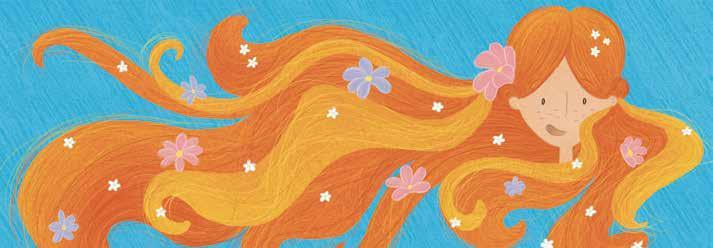
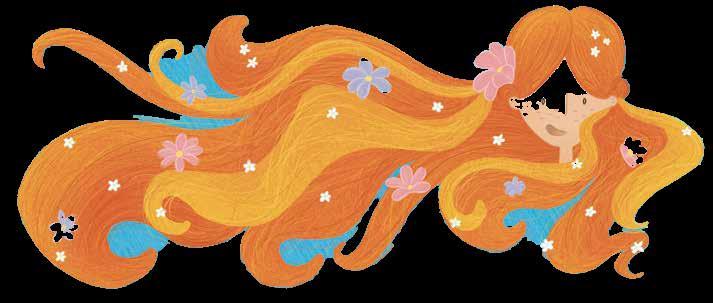

The book is the story of Anne Shirley, an orphan girl who is adopted by Marilla and Matthew Cuthbert. The Cuthberts are quite old and live on a farm called Green Gables in Avonlea, an imaginary place on Prince Edward Island. The book follows Anne from her arrival at Green Gables at 11 until she is 18. Anne has got red hair but she doesn’t like it. She is intelligent, talkative and impulsive. She loves nature, imagination and adventure, but she sometimes gets into trouble!
LUCY MAUD MONTGOMERY (1874-1942)
She was a Canadian author. She lost her mother when she was a baby and grew up with her grandparents on Prince Edward Island. She became famous for her books about red-haired Anne Shirley. Her stories reflected the author’s experiences as a child and a teenager. Other books: Anne of Avonlea, Anne of the Island.
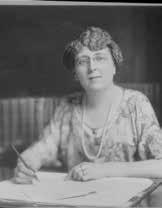

ANNE SHIRLEY
is an orphan who is adopted by Matthew and Marilla Cuthbert and grows up on their farm, Green Gables. Anne has imagination, intelligence, and independence.


is a sixty-year-old unmarried farmer. He lives at Green Gables with his sister Marilla. He is very shy. He convinces Marilla to adopt Anne.
MARILLA CUTHBERT
is Matthew’s unmarried sister. She adopts Anne with her brother. She is very strict and has difficulty in expressing her emotions.

DIANA BARRY
is Anne’s best friend. She is pretty and romantic. Diana and Anne become close friends immediately after they meet.

GILBERT BLYTHE
is a handsome, smart boy. He is Anne’s rival for most of the book. In the end Anne and Gilbert become friends.
1
Prince Edward Island
It is Canada’s smallest province. It is only 280 kilometres long and is connected to the mainland by a bridge. The Island is famous for its red sand, lighthouses, and farms. It is also called the ‘Garden of the Gulf’ for its fertile ground.

Charlottetown,

Avonlea
A fictional place. It is a community where all the protagonists live, and most Anne’s adventures are set.
‘Anne
Matthew and Marilla Cuthbert's farm where Anne lived after she was adopted.
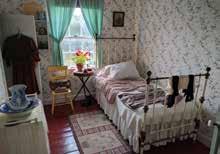

with an E’, the TV series
Anne with an E is a very famous adaptation of Anne of Green Gables It was made into a TV series by the Canadian television in 2017.
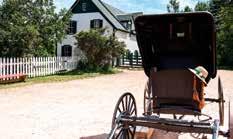
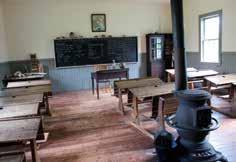
1 Matthew and Marilla Cuthbert were brother and sister and lived together on their farm called Green Gables in the town of Avonlea. Matthew was about sixty and worked on the farm. One afternoon Matthew went out in his buggy, and that was very unusual for him.
Rachel Lynde was Marilla’s friend. She was a nosy woman and went to Green Gables to ask where Matthew was going. Marilla explained that Matthew had heart troubles and needed help on the farm.
HE’S GOING TO THE STATION TO MEET A BOY FROM THE ORPHANAGE
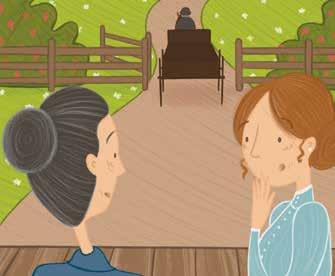
AN ORPHAN BOY? NOT A GOOD IDEA, MARILLA..
3 Matthew was confused but then decided to take the girl home. On the way back Anne didn’t stop talking. She had a lot of imagination, and Matthew enjoyed her company.
“The countryside is beautiful!” said Anne. “Look at that pond! I’ll call it The Lake of Shining Waters. I’m so happy! But I can’t be perfectly happy because of my freckles… and my hair!”
4
2 When Matthew arrived at the station there was no boy there. There was only a girl in an ugly old dress. She was about eleven, very thin, with long red hair, freckles, and grey eyes.
“There’s a passenger for you, Matthew. She came with Mrs Spencer,” said the stationmaster. “A girl? I’m expecting a boy, not a girl!” said Matthew surprised.
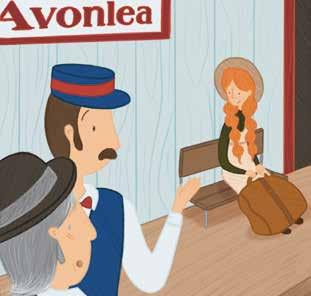
GOOD AFTERNOON, SIR. MY NAME IS ANNE.
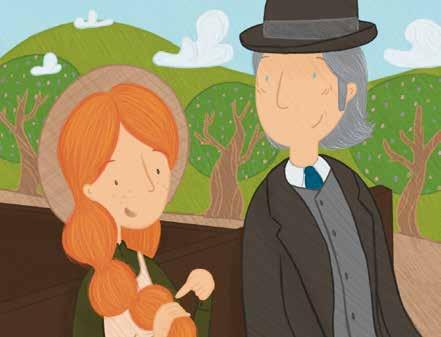
I DON’T LIKE FRECKLES OR RED HAIR… BUT I CAN’T CHANGE MYSELF!
5 Marilla was very disappointed when Matthew arrived with a girl. He was embarrassed and Anne was silent.
“Who is this girl, Matthew?” said Marilla. “We asked for a boy! We don’t want a girl!”
Anne started crying. “You don’t want me because I’m not a boy! Nobody likes me!”
Marilla felt sorry and tried to smile. “Come on, stop crying. Dinner’s ready.”
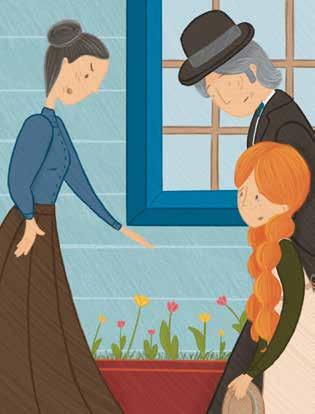
BY THE WAY, WHAT’S YOUR NAME?
ANNE SHIRLEY. IT’S ANNE WITH AN ‘E’! IT LOOKS NICER THAN JUST ANN…
buggy calesse nosy ficcanaso heart troubles problemi di cuore orphanage orfanotrofio ugly brutto freckles lentiggini stationmaster capostazione pond laghetto
Shining Waters Acque Luccicanti disappointed delusa, amareggiata embarrassed imbarazzato felt sorry era dispiaciuta By the way A proposito
1 TRUE OR FALSE? • Ascolta l’episodio 1 e decidi se le frasi sono vere (T) o false (F). Poi correggi le frasi false sul quaderno.
1. Matthew and Marilla lived on a farm called Green Gables T F
2. They wanted to adopt a girl from the orphanage. T F
3. Marilla needed some help for the housework. T F
4. Anne was happy when she met Matthew at the station. T F
5. Marilla was upset when she saw Anne. T F
6. Anne was shy and didn’t talk much. T F
2 WHO’S WHO? • Scrivi i nomi dei personaggi per riassumere l’episodio. Poi ricopia sul quaderno.
1. had problems with his heart.
2. decided to adopt a boy from the orphanage.
3. said that the girl had come with Mrs Spencer.
4. said that an orphan wasn’t a good idea.
5. was surprised when he saw Anne at the station.
6. said that they didn’t need a girl.
7. cried because nobody liked her.
1 When they were alone Matthew and Marilla talked about the girl.
“We can’t keep her, Matthew,” said the woman.
“What good can she be to us?”
“But we can be some good to her!” replied her brother.
The next morning Anne was happy when she saw the garden full of trees and flowers. Then she remembered that nobody wanted her and felt unhappy again. However, at breakfast she talked a lot, but Marilla stopped her.
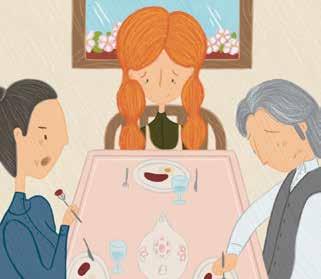
STOP CHATTING AND FINISH YOUR BREAKFAST. WE’RE GOING BACK TO THE ORPHANAGE LATER…
3 Marilla felt pity for the little girl. Anne, however, wasn’t sorry for herself.
When they arrived at the orphanage Marilla explained the mistake.
“We wanted a boy, not a girl!”
“Oh, I’m really sorry, Miss Cuthbert,” Mrs Spencer apologized. “I’ll find you a boy. As for Anne, we can send her to Mrs Blewett, who is looking for a baby-sitter. Look, she's coming.”
Marilla didn’t like Mrs Blewett because she was nasty and stingy.
“You’re skinny but you look strong, Anne. You can start work immediately,” Mrs Blewett said. Anne looked so miserable that Marilla refused.
2
On the way to the orphanage that afternoon, Anne talked about her childhood. She was born in Nova Scotia, her parents were teachers but died when she was very young. She had no relatives, so she went to live with some families. She looked after the children, but the last family had eight kids!
AFTER THAT I WENT TO THE ORPHANAGE, WHERE I STAYED FOR FOUR MONTHS.
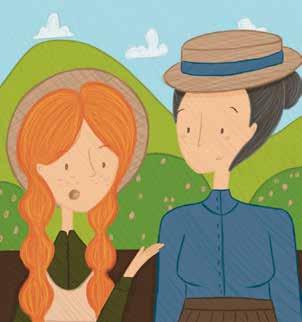
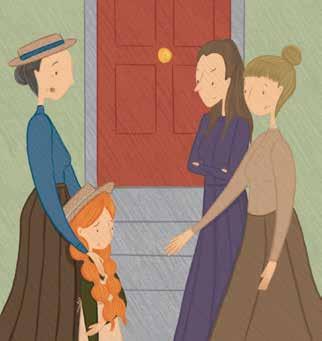
NO, SHE CAN’T COME. I MUST DISCUSS THE SITUATION WITH MATTHEW FIRST.
4 And so, Marilla and Anne returned to Green Gables. Marilla told her brother the girl’s story, and they agreed to keep her. The next morning Marilla told Anne to do the house chores. The girl worked hard and learnt quickly. But she was sometimes daydreaming and forgot to finish a task. Then Marilla spoke to Anne.
MATTHEW AND I HAVE DECIDED TO KEEP YOU, BUT YOU MUST BE GOOD.
1 SUMMARY • Ascolta, leggi l’episodio 2 e riordina le frasi.
A. Marilla and Anne went back to Green Gables
B. Marilla wasn’t happy with Mrs Spencer’s idea.
C. Marilla told Mrs Spencer that they didn’t need a girl.
D. Matthew wanted to keep Anne at Green Gables.
E. Marilla and Matthew decided that Anne could stay with them.
F. Marilla took Anne back to the orphanage.
G. Mrs Spencer was sorry for the mistake and suggested a solution.
OH, THANK YOU, MARILLA! I PROMISE!
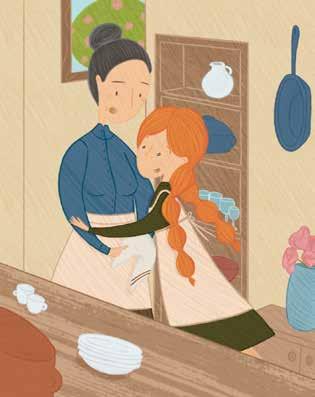
5 She was so happy and excited that she started crying.
childhood infanzia pity pietà apologized si scusò nasty cattiva stingy avara skinny magrissima, ossuta miserable infelice agreed si accordarono house chores faccende domestiche was … daydreaming sognava ad occhi aperti
H. Mrs Spencer said Anne could work as a baby-sitter for Mrs Blewett.
2 QUESTIONS • Rispondi alle domande.
1. How did Anne feel the next morning?
2. Was Anne silent during breakfast?
3. What happened to Anne after her parents died?
4. How long did she stay at the orphanage?
5. Why did Marilla refuse to leave Anne with Mrs Blewett?
6. How did Anne do the house chores?
1 “Do you ever imagine things, Marilla?” asked Anne. “I have an imaginary friend, called Katie.”

MY IMAGINARY FRIEND LOOKS LIKE ME, BUT SHE’S PRETTIER. DO YOU THINK I CAN HAVE A BEST FRIEND?
2 Marilla told Anne about Diana Barry, a girl who lived nearby. Diana was about Anne’s age, and she was nice and smart. Anne asked if Diana was pretty, too. “To be good is more important than to be pretty,” answered Marilla.
3 Anne helped Marilla with the chores and discovered new things every day in the fields. When she talked about her discoveries Matthew was very pleased but Marilla didn’t show her feelings. One day Mrs Lynde came over to meet Anne. She was curious to see what she was like. The girl was in the orchard and ran into the house. Her hair was messy and her dress was old.
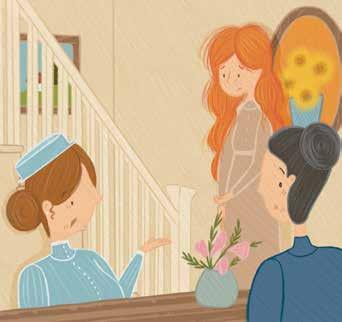
AH, HERE YOU ARE. UHM, SKINNY, FULL OF FRECKLES AND… HAIR AS RED AS CARROTS!
LOOK AT YOU, MRS LYNDE! YOU’RE SUCH A RUDE WOMAN! I WILL NEVER FORGIVE YOU!
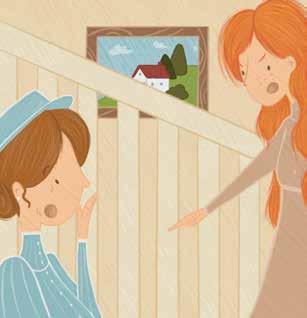
4 Anne was furious and stamped her feet as she spoke. Then she burst into tears and ran up to her room. Mrs Lynde was horrified at the girl’s violent reaction. She said that Anne was very naughty. Marilla was embarrassed and told Mrs Lynde that her words were inappropriate. But the woman was too angry. “Good luck with her, Marilla,” she added before leaving the house.
5 Marilla ordered Anne to apologize to Mrs Lynde. But Anne refused and Marilla punished her: she had to stay in her room until she changed her mind. Anne had her meals in her room for a day, then Matthew convinced her. She went to Mrs Lynde’s house with Marilla and apologized in a funny way. Mrs Lynde was satisfied and forgave Anne.
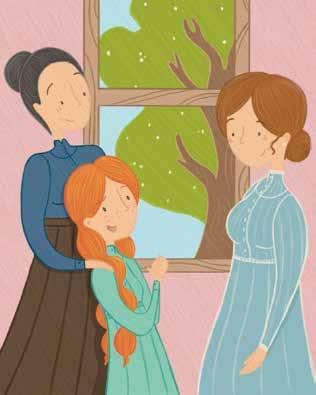
WHAT YOU SAID IS TRUE, MRS LYNDE. I HAVE FRECKLES AND RED HAIR. WHAT I TOLD YOU IS TRUE TOO, BUT I’M SORRY I SAID IT!
looks like me mi assomiglia nearby lì vicino smart intelligente discovered scopriva discoveries scoperte feelings sentimenti orchard orto messy in disordine rude maleducata stamped pestava burst into tears scoppiò in lacrime naughty cattiva punished her la punì changed her mind cambiava idea
1 SUMMARY • Ascolta, leggi l’episodio 3 e completa il testo con le parole indicate.
angry • meet • Diana • best • sorry • hair • nice • apologize • friend • things
Anne had an imaginary (1) and liked to have a (2) friend. Marilla told her about (3) Barry, who was (4) and smart. One day Mrs Lynde went to Green Gables to (5) Anne. The girl had an old dress and messy (6) , and Mrs Lynde said nasty (7) about Anne’s appearance. Anne got (8) and told Mrs Lynde she was rude. Then Anne refused to (9) but she said she was (10) in the end.
2 WHO’S WHO? • Scrivi accanto ad ogni frase il nome del personaggio a cui si riferisce.
1. She’s prettier than Anne.
2. She lives near Green Gables
3. She likes to be in the fields.
4. She’s nosy and rude.
5. He convinces Anne to apologize.
6. She wishes Marilla ‘good luck’.
7. She punishes Anne.
8. She refuses to say she’s sorry.
1 Marilla made Anne a new dress to go to Sunday School. The dress was dark and plain, and Anne didn’t like it. Along the way she picked some flowers and put them on her hat. At Sunday School the other girls had bright dresses and looked at Anne in a strange way: she was odd in her plain dress with wildflowers on her hat. In class the teacher asked easy questions and Anne got bored.
HOW WAS SUNDAY SCHOOL?
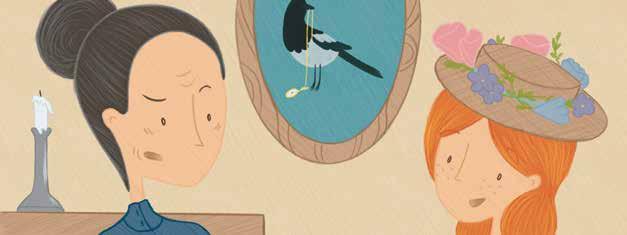
NOT SO INTERESTING. I ANSWERED ALL THE TEACHER’S QUESTIONS AND LOOKED OUT OF THE WINDOW…
2
Some days later Marilla took Anne to meet Diana Barry. Anne was excited, but she was also worried about Mrs Barry, who was very strict. Diana was very pretty. She had a nice face, black hair and dark eyes. She liked to have a friend who lived nearby because her sisters were too young. Anne greeted Mrs Barry politely and went outside with Diana. They sat among the flowers and swore an oath.
I PROMISE TO LOVE MY SPECIAL FRIEND DIANA FOREVER.
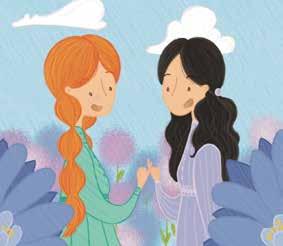
YOU’RE A FUNNY GIRL, ANNE!
3
The Sunday School was organizing a picnic with real ice cream and Anne was so excited that she couldn’t stop talking about it. Marilla gave her permission to go and she also offered to cook some food. Some days before the picnic Marilla couldn’t find her amethyst brooch. Anne said she had tried the brooch on and had put it back afterwards, but Marilla didn’t believe her. Then, the day of the picnic arrived.
WHERE’S MY BROOCH? YOU’RE NOT GOING TO THE PICNIC IF YOU DON’T CONFESS!
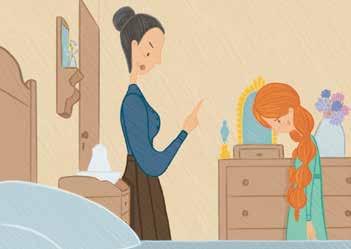
OK, I CONFESS. I TOOK IT, WENT TO THE LAKE AND ACCIDENTALLY DROPPED IT INTO THE WATER…
4That wasn’t true. Anne confessed just because she wanted to go to the picnic. But Marilla’s punishment was that Anne couldn’t go anyway! Anne was desperate. She cried all her tears and didn’t eat anything. Then, unexpectedly, after lunch Marilla found the brooch in an unusual place and said she was sorry.
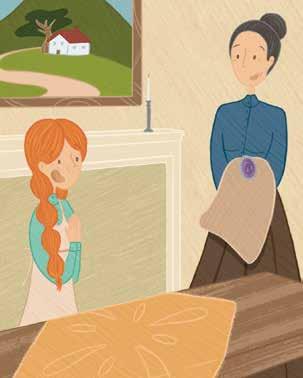
I’M SORRY, TOO, BECAUSE I TOLD YOU A LIE
LET’S FORGET ABOUT IT. YOU CAN GO TO THE PICNIC NOW. HURRY UP!
5
‘It’s never boring with Anne around,’ Marilla thought.
plain semplice picked raccolse odd strana, bizzarra strict severa swore an oath fecero un giuramento amethyst brooch spilla di ametista tried … on si era provata dropped it l’ho fatta cadere punishment punizione tears lacrime lie bugia
1 TRUE OR FALSE? • Ascolta, leggi l’episodio 4 e decidi se le frasi sono vere (T) o false (F). Poi correggi le frasi false sul quaderno.
1. Anne goes to Sunday School with a new dress.
2. Anne meets Diana Barry at Sunday School.
3. Mrs Barry, Diana’s mum, is gentle and kind.
4. The two girls promise to be friends forever.
5. Anne is invited to a picnic and she’s very excited. T F
6. Marilla loses her ring and thinks Anne is responsible. T F
7. Anne confesses she took the brooch. T F
8. Matthew finds the brooch and Anne can go to the picnic. T F
2 COMPLETE • Completa usando il Past Simple (affermativo o negativo) del verbo tra parentesi.
1. Anne that Sunday School was boring. (think)
2. Anne her new dress because it was dark. (like)
3. The Sunday School teacher difficult questions. (ask)
4. Marilla Anne to Diana’s house. (take)
5. Diana and Anne an oath. (swear)
6. Anne stop talking about the picnic. (can)
7. Anne responsible for Marilla’s brooch. (be)
8. Marilla her brooch in an unusual place. (find)
1 School started in September and Anne walked to school with Diana every day. Everything was beautiful, the trees, the flowers, the birds. At school there were students of all grades, from children to teenagers studying to pass the exam for Queen’s Academy. Anne liked school. She was a good pupil but she didn’t like the teacher, Mr Phillips.
2 Gilbert Blythe arrived in Anne’s class in October. He had been away because his father was ill. He was smart and handsome, and most girls had a crush on him. Gilbert liked to tease girls. At school, he tried to attract Anne’s attention, but she was daydreaming and didn’t notice him.
So, he pulled Anne’s hair and called her ‘Carrots’! Anne was furious. She jumped up and broke her slate on Gilbert’s head.
HOW DARE YOU? I HATE YOU!!
GILBERT BLYTHE IS COMING BACK SOON. HE’S THE BEST STUDENT IN THE CLASS… AND HE’S CUTE, TOO!
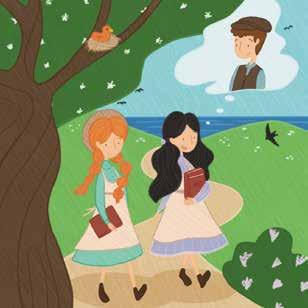
3 Mr Phillips got angry but he only punished Anne, not Gilbert. He ordered her to stay in front of the blackboard where he wrote something about her bad temper.
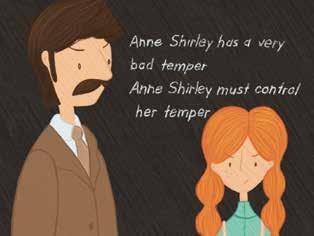
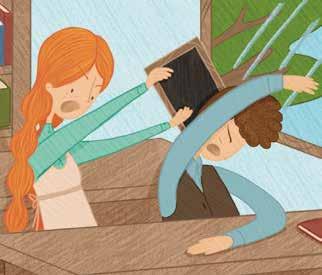
4 The next day during Mr Phillips’ lesson Anne was talking to a boy. “If you like boys, go and sit next to Gilbert Blythe!” ordered Mr Phillips.
Anne was furious again. She didn’t want to sit near Gilbert. Later Gilbert apologized and gave Anne a candy, but she threw it away.
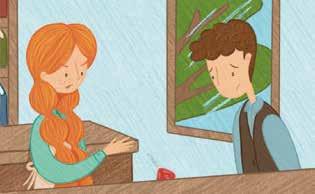
I DON’T WANT YOUR CANDIES. I WILL NEVER FORGIVE YOU!
CARROTS! CARROTS!5 That afternoon, when she got home, Anne told Marilla she didn’t want to go to school anymore.
Anne was lonely and bored so she invited Diana at Green Gables. The girls played in the orchard and ate fruit from the trees. Diana was thirsty and Anne offered her some juice from a bottle. But it wasn’t juice, it was wine!
Diana drank three glasses and felt sick.
I FEEL SICK… I WANT TO GO HOME… WHAT’S THE MATTER, DIANA?
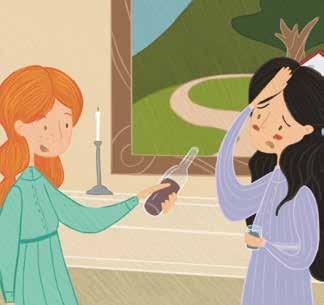
6 From then on, Mrs Barry prohibited Diana to see Anne. Some days later Anne decided it was time to go back to school.
1 SUMMARY • Ascolta e leggi l’episodio
5. Poi unisci la prima parte (1-8) alla seconda parte (A-H) delle frasi per riassumere.
1. When school started in autumn
2. On the way to school Diana talked about
3. Everybody at school liked Gilbert,
4. Gilbert called Anne ‘Carrots’
5. Anne got so angry that
6. Mr Phillips, the teacher, ordered Anne
7. Anne didn’t go to school any more
8. She invited Diana at Green Gables
A. and he liked to tease girls.
B. to sit next to Gilbert.
C. trees and flowers were beautiful.
D. but she felt bored and lonely.
E. just to attract the girl’s attention.
F. but gave her wine instead of juice.
G. she broke her slate on Gilbert’s head.
H. a boy in their class called Gilbert Blythe.
2 WHO SAYS IT? • A quale personaggio si possono attribuire queste frasi?
1. I like school, but I don’t like Mr Phillips.
2. I was away for some months because my dad was ill.
3. You have a very bad temper, Anne Shirley!
Glossary
He had been away Era stato via a crush una cotta slate lavagnetta How dare you? Come osi? temper carattere I will never forgive you Non ti perdonerò mai
4. I’m sorry, Anne. Have a candy and let’s be friends.
5. I hate school! I don’t want to go back to that horrible place!
6. I'm thirsty. Can I have something to drink?
1 One night Minnie, Diana’s little sister, had a high temperature and was getting worse. Diana’s parents were away, and Diana called Anne for help. Anne gave Minnie the right medicine, so Minnie was better. Mrs Barry apologized to Anne and thanked her. Anne and Diana could be together again.
MINNIE IS BETTER NOW… OH, THANK YOU, ANNE!
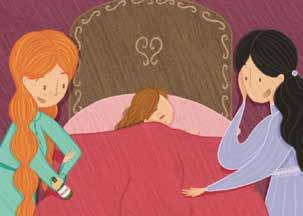
3
One day Anne was near the Lake of Shining Waters playing with her friends. She was a dead princess sailing in a boat on the water. Suddenly the boat was full of water, and Anne was in danger. Gilbert saw the scene and helped Anne get into his boat. Anne thanked him coldly.
CAN WE BE FRIENDS NOW?
2
Time passed quickly. Anne was fourteen but still didn’t like her red hair. One day she tried a product which promised to change any hair colour to brown. She tried the product but she was shocked when she saw the result. Her hair was green! She didn’t go to school for a week but her hair was still green.
OH, MARILLA, I WASH MY HAIR EVERY DAY… WHAT CAN I DO?
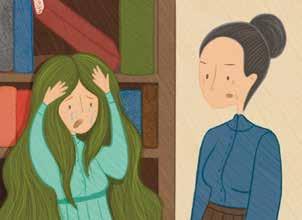
YOU MUST CUT YOUR HAIR OFF!
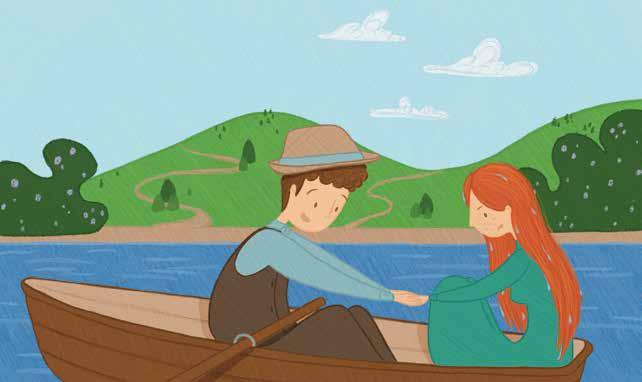
NO, I’M SORRY. WE CAN NEVER BE FRIENDS!
4 Anne and Gilbert were the best students in the class, and Mrs Stacey, their teacher, organized special lessons for bright students to go to Queen’s Academy. Anne was thrilled. She studied hard during the school year and she finally sat for the exams. Two weeks passed. Then, one day Diana arrived with a newspaper…
1 SUMMARY • Ascolta, leggi l’episodio 6 e scrivi un titolo per queste tre avventure di Anne. Poi completa con la forma del Past Simple del verbo tra parentesi.
LOOK! YOU AND GILBERT GOT TOP MARKS IN YOUR EXAMS! YOU CAN GO TO QUEEN’S ACADEMY!

5 Anne was fifteen when she left for Queen’s Academy in Charlottetown. It was very sad for her to leave Green Gables, Matthew, Marilla, Diana and all her friends.
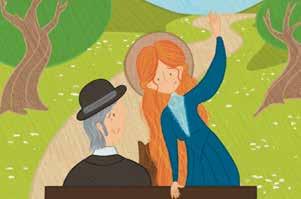
I WILL NEVER FORGET YOU!
6 At the Academy she studied all day because two of the best students could get a scholarship to go to a renowned university, Redmond College.
sailing che navigava coldly freddamente bright molto bravi thrilled entusiasta sat for partecipò scholarship borsa di studio renowned rinomata
1. Anne (1) (cannot) go to Diana’s house because Mrs Barry was still angry with her. But one night Minnie, Diana’s sister, was sick. Anne (2) (give) Minnie the right medicine. Mrs Barry thanked her. So Diana and Anne (3) (be) friends again.
2.
Anne was fourteen and she still (4) (not like) her red hair. She decided to dye it, but her hair (5) (turn) green! She was desperate and, in the end, she (6) (cut) her hair off.
3.
One day Anne (7) (fall) into the lake while she was playing with her friends. Gilbert was in a boat and saved her. Anne (8) (say) ‘Thank you’ but refused to be Gilbert’s friend.
QUESTIONS • Rispondi alle domande.
1. How good was Anne at school?
2. Who got top marks in the exams?
3. Where did Anne go after her exams?
4. How old was Anne when she left for Queen’s Academy?
5. Who could get a scholarship?
1 At Queen’s, Anne made new friends and went home every weekend. She and Gilbert were always at the top of the class, and at the end of the school year they passed the examinations to become teachers. Gilbert also won a medal and Anne won the scholarship for her university. Gilbert couldn’t afford to go to university and decided to be a teacher at Avonlea school.
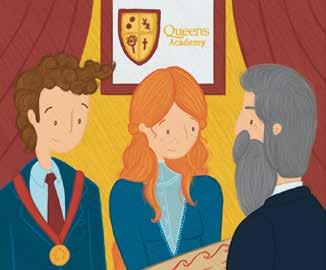
2
While Anne was at home for her holidays Matthew’s heart problems worsened. Marilla, too, had problems with her eyes. Moreover, their money in the bank was at risk because the bank was in a bad situation. One day Matthew read about the bank collapse in the newspaper. All their money was lost! The poor man had a heart attack and died before the doctor’s arrival.
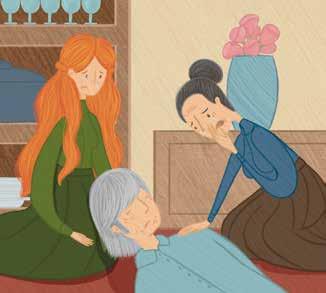
specialist and came home very depressed. Her eyes had problems: she couldn’t read or Marilla talked to Anne very seriously. It was a difficult moment for them, life without Matthew was hard, and they had little money.
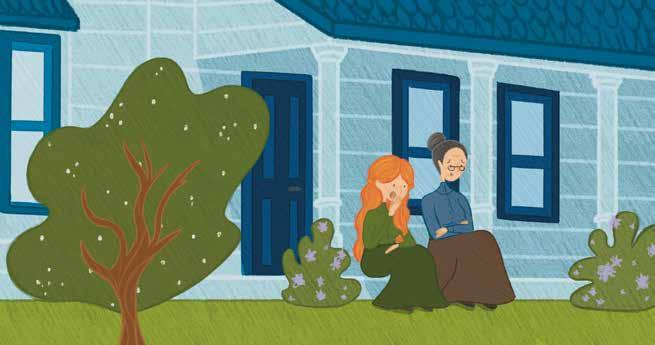
I LOVE YOU LIKE A DAUGHTER! THAT’S WHY I’M GOING TO SELL GREEN GABLES, SO THAT YOU CAN GO TO UNIVERSITY…
OH, MATTHEW… GOODBYE, ANNE, GOODBYE MARILLA! TAKE CARE…4
That was a shock for Anne. ‘Marilla mustn’t sell Green Gables,’ she thought. ‘I must stay here with her. I can be a teacher in a village near home.’ She told Mrs Allan, the reverend’s wife, about her plan, and Mrs Allan talked to Gilbert. He offered to give up his position as teacher in Avonlea. Anne could take his place and stay at home with Marilla. The next day Anne met Gilbert along the road and thanked him for his generosity. He took her hand.
CAN WE BE FRIENDS AT LAST?
OF COURSE, GILBERT. WE CAN BE BEST FRIENDS! IT WAS SO STUPID OF ME…
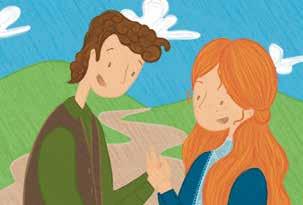
5 They walked home together. Marilla saw Gilbert and smiled. Anne was satisfied. She couldn’t go to university but that wasn’t a problem. She had her books, and she had a job. She had Marilla, she had Green Gables and lots of friends. And she had Gilbert… Her future was exciting!
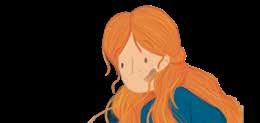
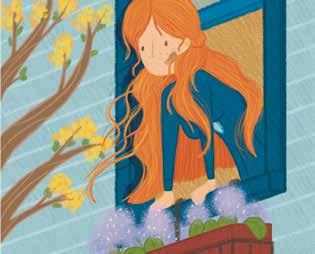
Glossary
afford permettersi worsened peggiorarono bank collapse bancarotta
1 CROSSWORD • Leggi le definizioni e completa il cruciverba.
ACROSS →
2 Marilla and Matthew have their money here.
4 He becomes Anne’s best friend in the end.
5 Gilbert wins a … for his top results.
6 Their … was at risk in the bank.
7 Gilbert wants to be a … at Avonlea school.
9 Marilla must wear them.
10 Gilbert and Anne pass them.
12 Anne wins it to go to university.
14 It is exciting for Anne.
DOWN ↓
1 Marilla loves Anne like a …
3 The name of the farm where Anne lives.
8 Matthew dies of this.
11 The town where Anne will teach.
13 Marilla wanted to … Green Gables
8 Riordina i testi (a-g) per ricostruire il riassunto della storia aiutandoti con i disegni. Infine ascolta e verifica.
At Sunday School Anne looks odd in her plain dress with wild flowers on her hat. She is invited to a picnic, but she can’t go because Marilla doesn’t find her brooch. Anne makes a false confession, but Marilla doesn’t let her go. In the end, Marilla finds the jewel and Anne can go to the picnic.
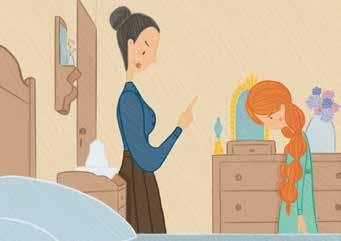
WHERE’S MY BROOCH? YOU’RE NOT GOING TO THE PICNIC IF YOU DON’T CONFESS!
LOOK! YOU AND GILBERT GOT TOP MARKS IN YOUR EXAMS! YOU CAN GO TO QUEEN’S ACADEMY!
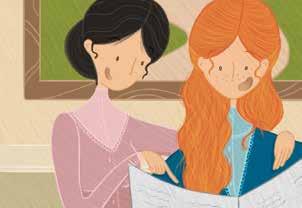
Matthew likes this skinny girl who talks a lot, but Marilla decides to take her back to the orphanage. After hearing her sad story, however, Marilla feels pity for Anne. She refuses to leave Anne with a nasty woman and takes her back to Green Gables
OK, I CONFESS. I TOOK IT, WENT TO THE LAKE AND ACCIDENTALLY DROPPED IT INTO THE WATER…
Anne saves Diana’s sister, and the two girls can be friends again. One day Anne dyes her hair, but it gets green, and she has to cut it off! Another day, while she is in a boat on the lake, Gilbert saves her, but she still refuses to forgive him. Time passes. At 15 Anne gets top marks at the exams for Queen’s Academy and leaves Avonlea.
AFTER THAT I WENT TO THE ORPHANAGE, WHERE I STAYED FOR FOUR MONTHS.
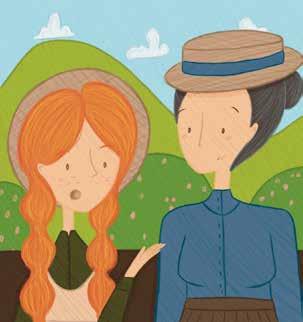
GOOD AFTERNOON, SIR. MY NAME IS ANNE.

Anne and Gilbert are top students. He decides to be a teacher in Avonlea and Anne would like to go to university. But Matthew dies, and Marilla wants to sell Green Gables because she has no money. Gilbert offers Anne his job as a teacher so she can be with Marilla. In the end Anne and Gilbert become friends again.
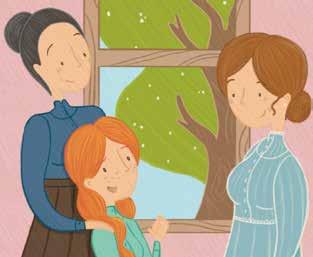
WHAT YOU SAID IS TRUE, MRS LYNDE. I HAVE FRECKLES AND RED HAIR. WHAT I TOLD YOU IS TRUE TOO, BUT I’M SORRY I SAID IT!
Anne and Diana Barry become best friends and go to school together. Gilbert Blythe, the smartest student in the class, calls Anne ‘Carrots’, and she reacts angrily. As a punishment she must sit next to him. So, she decides to leave school but feels lonely. She invites Diana but gives her wine instead of juice and Diana gets sick.
Anne Shirley is an eleven-year-old orphan with freckles and long red hair. Marilla and Matthew are brother and sister and live on a farm called Green Gables, near the town of Avonlea. They asked the orphanage for a boy to help Matthew who is old and sick. But a girl, not a boy, arrives.
CAN WE BE FRIENDS AT LAST?
OF COURSE, GILBERT. WE CAN BE BEST FRIENDS! IT WAS SO STUPID OF ME…
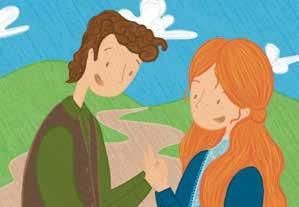
Anne loves Green Gables and helps Marilla with the chores. She works hard but is often daydreaming. One day Mrs Lynde, Marilla’s friend, makes fun of her hair and freckles, and Anne has an angry reaction. She refuses to apologize at first but then Matthew convinces her.
HOW DARE YOU? I HATE YOU!!
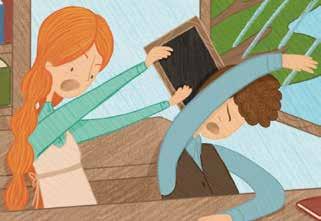
1 9 LISTEN AND READ • Andy è un ragazzo australiano che oggi ha aperto un blog. Ascolta e leggi quello che scrive.
That’s my first

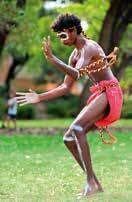
, so here I am. My name’s Andy Vallarino and I’m thirteen. I live in Adelaide, a lively, multicultural city in South Australia. My house is near Hurtle Square (Tangkaira in Aboriginal language), one of the four big parks in town. I was born here but my parents are not Australian. Mum is Irish and Dad is Italian. They met in Sydney and then moved here. My mother’s parents live in Dublin and my father's family live in Trapani, in Sicily. That’s why I can speak a bit of Italian. I have a big family with lots of aunts, uncles and cousins, and my grandparents, of course! I’m in year 8 at Adelaide High, it’s the oldest high school in town. I’m good at all subjects, but my favourites are Maths and Music (I’m on a guitar course at school). As for sports, I play rugby in the school team. I am an optimist and those who know me say I’m positive, responsible and sensible... but I think they’re too kind!
2 READ AND WRITE • Vero (T) o falso (F)? Poi correggi le frasi false.
1. Andy is an Australian boy of European origin.
T F
2. Tangkaira is the Aboriginal name of Adelaide. T F
3. Andy’s parents met in Adelaide. T F
4. Andy speaks English and Italian. T F
5. Andy’s High School is the oldest school in Australia.
T F
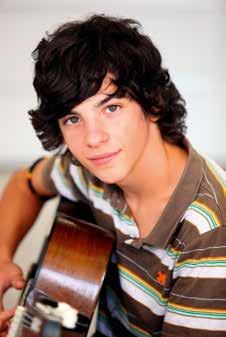
They met Si sono conosciuti a bit of un po’ di high school scuola superiore Glossary
Aborigines are the original inhabitants of Australia. They have a unique culture, language and religion. Did you know?
6. Andy plays guitar at school. T F
7. All Andy’s relatives live in Italy. T F
8. Andy speaks Italian because he has lived in Trapani. T F
9. Andy’s teachers appreciate Andy’s personality. T F
10. Andy is good at all school subjects. T F
1 LOOK AND MATCH • Collega le immagini agli aggettivi corrispondenti come nell’esempio.
1. lazy
2. messy
3. tidy
4. polite
5. grumpy
6. calm
7. generous
8. rude
9. aggressive
10. cheerful
11. hard-working
12. intelligent
13. sensitive
14. shy


2




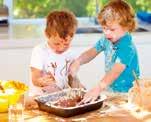
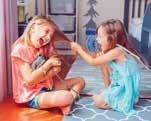





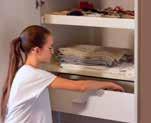
10 LISTEN AND CHOOSE • Ascolta Sheera che parla della sua personalità e scegli la risposta esatta.
1. Sheera is a. shy. b. grumpy. c. no longer shy.
2. She studies a. 3-4 days a week. b. 3-4 hours a day. c. 3-4 hours a week.
3. At school she a. respects the rules. b. is hard-working. c. is motivated.
4. She doesn’t like a. to get aggressive. b. to be contradicted. c. aggressive people.
5. She thinks she is a. happy. b. easy-going. c. good.

1 READ AND DISCOVER
• Che tipologia di animale sei? Prova il quiz e scopri che animale sei a pagina capovolta. Ti ritrovi nelle caratteristiche dell’animale?
1. Imagine you are a wild animal.
Someone is invading your territory. How do you react?
a I attack the invader.
b I don’t react at all.
c I negotiate.
d It depends. I’m not sure.
2. What is fascinating about animals for you?
a their power
b their relationships
c their intelligence
d all of them
3. What kind of animals will survive in the future?
a powerful ones
b smart ones
c none of them
d I don’t know
4. Fill in the blank.
I all animals.
a am indifferent to
b adore
c respect
d have sympathy for
5. In your opinion, what type of animals are dangerous?
a big ones
b none of them. All animals are lovely
c mammals or reptiles
d all of them

STRENGHTS
• Responsive
• Enthusiastic
• Friendly
• Talkative

STRENGHTS
• Leader
• Visionary
• Direct
• Insensitive
• Impatient
• Controlling
• Decisive WEAKNESSES
• Cold
WEAKNESSES
• Impulsive
• Undisciplined
• Unproductive
• Needs approval

STRENGHTS
• Analytical
• Decision-maker
• Industrious
• Organised
STRENGHTS
• Calm
• Loyal
• Diplomatic
• Humorous
WEAKNESSES
• Indirect
• Resists change
• Indecisive
• Lacks-initiative
WEAKNESSES
• Unsociable
• Self-centered
• Critical
• Negative

Ds: You’re a golden retriever.
Bs: You’re an otter. Mostly Cs: You’re a beaver.
As: You’re a lion.
1 Inserisci DO o DOES e completa con la short answer corretta.
1. ‘ lions eat meat?’ ‘Yes, .’
2. ‘ Andy live in the USA?’ ‘No, .’
3. ‘ your brothers play rugby?’ ‘No, .’
4. ‘ Zoe and Justin like chatting?’ ‘Yes, .’
5. ‘ Harry like Maths?’ ‘No, .’
6. ‘ you and Vera study Chinese?’ ‘Yes, .’
7. ‘ we recycle plastic, Dad?’ ‘Yes, .’
Ricorda!
USO
Azioni abituali.
2 Inserisci la forma corretta del PRESENT SIMPLE e la preposizione di tempo appropriata.
1. What time (Fiona get up)? She (wake up) 7 a.m. but on holidays she (sleeps) until 9.
2. It often (snow) January.
3. We (not go) to school Saturdays.
4. (you celebrate) Halloween October 31st?
5. Our grandparents always (go) on holiday spring.
6. When (school start) in Italy? September.
Azioni che si stanno svolgendo in un preciso momento. Ricorda!
3 Completa le frasi inserendo i verbi tra parentesi al PRESENT SIMPLE o al PRESENT CONTINUOUS.
ROUTINES ACTIONS TAKING PLACE NOW
1a. Andy and his friends usually (have) lunch at school.
2a. Andy’s mother (work) as a nurse.
3a. Andy’s grandparents (live) near Dublin.
4a. Andy's sister (study) Astrophysics In Sydney.
1b. It’s Andy’s birthday. Andy and his friends (have) lunch in a ‘pizzeria’.
2b. Andy’s mother (answer) some e-mails.
3b. Andy’s grandparents (spend) their holiday in Viareggio.
4b. It’s 8 p.m. Amy and the other girls (sing) in the local theatre.
4 PRESENT SIMPLE o PRESENT CONTINUOUS? Sottolinea la forma verbale corretta.
1. Have you got an umbrella? Look, it rains / it’s raining
2. They don’t often go / They aren’t often going to the theatre.
3. What time do you get up / are you getting up on Sundays?
4. Sorry, I don’t eat / I’m not eating pasta, I’m allergic to gluten.
5. ‘What do you eat / are you eating?’ ‘Just a steak and some chips.’
5 Riordina le frasi e scrivile su un foglio.
1. the / wear / know / to / don’t / what / party / I / for 2. in front / meet / Why / ? / we / of / library / the / don't
3. ’school / going / ? / you / by / to / bus / Are mum / school / morning / No, / me / driving / is / to / this’

Il Present Continuous è anche usato per azioni già programmate nel futuro e generalmente è accompagnato da espressioni di tempo riferite al futuro, come: tomorrow, this evening, next week...
➜ I’m going to London next week.
➜ I’m meeting John at the Tower of London on Friday.
➜ ‘What are you doing this evening?’
➜ ‘We’re going to a restaurant.’
6 Forma cinque frasi che descrivono i programmi di Carol. Ricorda di completare le frasi con le preposizioni appropriate dove necessario.
1. This evening / Carol and her family / not have dinner / home
2. Tuesday evening / Carol / play / volleyball / her friends
3. Tomorrow afternoon / Carol / go / swimming pool
4. Saturday / Carol and her brother / visit / their grandparents
7 Rispondi alle domande qui sotto parlando di te.
1. Are you going anywhere on holiday or are you staying at home?
2. When are you going back to school?
3. What are you doing this evening?


1 11 Leggi e ascolta il dialogo tra Minna e sua madre. Chi parla? Scrivi accanto a ciascuna battuta Minna o Mum, a seconda di chi parla secondo te.
‘Come on,’ I shout up the stairs. ‘We have to leave now.’
‘Hang on a minute!’
‘What are you doing up there?’
Her voice comes, all muffled, through the bedroom door:
‘Nothing.’
‘You must be doing something’, I yell
‘I’m not.’
‘Come down, then!’
‘Can’t find my shoes…’
‘Where did you take them off?’
‘I think I took them off in the bathroom…’
up the stairs su per le scale
Hang on Aspetta muffled attutita yell urlo did you take them off le hai tolte I'm getting really mad Mi sto proprio arrabbiando
‘Look there, then!... Will you come on?’ I shout.‘ I’m getting really mad now.’
‘I’m coming, I’m coming!’
‘Well, hurry up!’
Every morning it’s the same, every single morning. I’m standing by the front door with my coat on, ready to go. School starts at nine and it’s already eight-forty or even later, and she’s not ready. She’s not even nearly ready.
(abridged from Crummy Mummy and Me by Anne Fine, Penguin Books Ltd.)
2 Completa il riassunto con le parole del box. is shouting • shoes • late • bedroom • nine • worried It’s nearly 8.40 and Minna is (1) and nervous because school starts at (2) and her mum is (3) as usual. Minna (4) because her mum is still in her (5) looking for her (6)
3 Come definiresti la madre di Minna con due aggettivi? Cercali sul dizionario se non li sai.
4 Come sono gli adulti della tua famiglia? Scegli tra gli aggettivi qui sotto. authoritarian • democratic • strict • permissive • balanced
1 12 LISTEN AND READ • Ascolta e leggi il BLOG! di Andy.
Today I want to talk about my parents’ jobs. My father is a teacher; he teaches Maths and IT (Information Technology) at my school. My mother is a nurse and she works at the Royal Adelaide Hospital (we call it RAH colloquially). It’s South Australia’s largest public hospital. In my first blog I didn’t tell you about my sister Amy. She doesn’t live with us because she’s studying at Sydney University and guess what she’s doing? Astrophysics! She wants to become an astrophysicist! She studies the history of stars and galaxies and how the universe was created Cool, isn’t it? I have a dream for my future. When I was a child I wanted to be a pilot because I liked planes. And now I want to become a doctor… and I can visit patients by plane. That sounds a bit strange, but in Australia we have ‘flying doctors’!



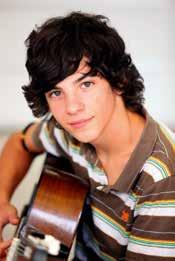
was created fu creato Cool Bello, Forte
That sounds a bit strange Suona un po’ strano remote remote, isolate Glossary
The Royal Flying Doctor Service (RFDS) is an emergency medical service for people who live, work or travel in rural and remote areas of Australia. The RFDS uses planes to reach their patients. It was founded in 1928. There are 5 different planes used for aeromedical operations in Australia.
2 READ AND WRITE • Leggi le frasi e dì se sono vere (T) o false (F). Poi correggi le frasi false.
1. Andy’s father teaches Maths in his son’s class. T F
2. Andy’s mother works in the biggest hospital in South Australia. T F
3. Andy’s sister wants to be an astrophysicist. T F
4. Amy isn't studying in Adelaide. T F
5. She’s studying astrophysics at school. T F
6. Astrophysics studies the origin of the universe. T F
7. The RFDS is a medical service that reaches towns and villages. T F
8. In Australia some doctors go to work by plane. T F
1 READ AND MATCH • Abbina ciascuna professione all’immagine corrispondente.
1. doctor
2. factory worker
3. cook
4. veterinarian (vet)




bricklayer




2 13 LISTEN AND MATCH •
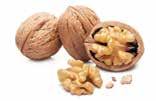
A
1. Jessica’s job
2. She works as a chocolate taster





B




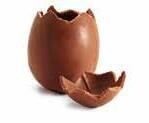
a. like nuts and dried fruit.
b. is fascinating.
3. She tastes chocolate and other ingredients
4. She also tastes
5. Jessica thinks that her job
6. She never gets tired of it
c. in a chocolate company.
d. because she’s very fond of chocolate!
e. is very unusual.
f. chocolate Easter eggs.
1 14 LISTEN AND READ • Ascolta e leggi ciò che dice Timothy.
I’m fifteen and I go to a school in Manchester (1). I have a few hobbies, mainly volleyball, music and playing drums (2).
I also do a part-time job as a volunteer (3) for a local charity. I started volunteering last January and I work in the charity shop (4) every Saturday afternoon. Well, I sell lots of different kinds of things (5), food, tea, coffee, clothes, handicrafts from all parts of the developing world. We also sell secondhand things (clothes, books, furniture etc.).
Some of my friends say I’m mad because I don’t get any money from this job (6). But I really enjoy it. I’m doing something to help poor people and children who haven’t got the same opportunities as me.


2 READ AND WRITE • Rileggi il testo e scrivi le domande che corrispondono alle parti in rosso nel testo. Osserva l’esempio.
1. Where does Timothy go to school?
2. ? 3.
3 SPEAK • Ora rispondi alle domande in modo personale.
1. Would you like to do volunteer work?
2. Which of the following would you like to do? Choose one or more options.
a. work for a charity
b. look after old people
c. look after children in a hospital
d. organize fundraising events
e. look after abandoned animals
Glossary
La forma del Past Simple è uguale per tutte le persone, fatta eccezione per il verbo BE. Il Past Simple è usato per raccontare un fatto che si è concluso in un preciso momento nel passato, generalmente con espressioni come:
yesterday (ieri), two/three... days ago (due/tre... giorni fa), last week/month/year (la settimana scorsa/il mese/l’anno scorso). In italiano corrisponde al passato prossimo, al passato remoto e all’imperfetto indicativo.
Il Past Simple di BE ha due forme: WAS (con la 1° e 3° persona singolare) e WERE (con tutte le altre persone).
AFFERMATIVE INTERROGATIVE NEGATIVE WAS WAS…? WASN’T WERE WERE…? WEREN’T
Il Past Simple di HAVE nella forma affermativa è HAD (senza GOT) per tutte le persone. Nella forma interrogativa e negativa HAVE segue la regola dei verbi ordinari.
1 Completa le seguenti frasi con la forma appropriata del PAST SIMPLE di BE o HAVE.
1. Fiona __________________ (not) at school yesterday. ________________ she ill?
2. Yes, she __________________ breakfast and then________________ sick.
3. ‘Why ________________ you angry after the match?’ ‘Because the result ________________ fair!’
4. I __________________ a great time at the swimming pool yesterday!
5. There __________________ a lot of people at the disco last night.
6. The students __________________ worried this morning because the Maths test __________________ difficult and the teacher __________________ a terrible headache.
7. We __________________ a snack at 4 because we __________________ very hungry.
2 Riordina le parole per formare frasi di senso compiuto.
1. this / were / school / You / morning / late / for .
2. Meg’s / had / great / a / last / time / party / night / We / at
3. at / and / friends / I / had / school / My / lunch / yesterday .
4. this / five / were / at / afternoon / you / Where / ? .
FORMA BASE DEL VERBO + -ED
Si ottiene aggiungendo -ED alla forma base. listen ➜ listened watch ➜ watched play ➜ played
love ➜ loved arrive ➜ arrived stop ➜ stopped travel ➜ travelled study ➜ studied cry ➜ cried
3 Inserisci la forma corretta del PAST SIMPLE dei verbi regolari tra parentesi.
1. My grandparents (move) to Australia in 1962.
2. My family and I (stay) at a hotel in London for a week.
3. During the Covid pandemic a lot of people (work) from home.
4. Jane (study) Chinese at school last year.
5. Andy (watch) a cartoon on TV yesterday evening.
6. Amy (arrive) at home before it (start) raining.
Nella forma affermativa del Past
Simple i verbi irregolari si comportano ciascuno in modo differente.
come ➜ came do ➜ did go ➜ went leave ➜ left eat ➜ ate buy ➜ bought
4 Completa le frasi con il PAST SIMPLE dei verbi nel box. come • be (x2) • have • go • take • write • get
1. Where Dracula last night? He home very late!
2. We to Sydney on a school trip last summer.
3. I my first smartphone when I 13.
4. The teacher our names on the blackboard.
5. Brian’s mother us to an amusement park last Sunday.
6. We a placement test this morning.
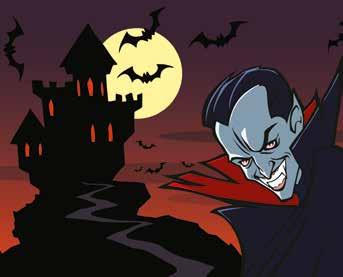


1 Risolvi il cruciverba

2 He/she drives planes.
4 Short for ‘veterinarian’.
8 He/she builds walls and houses.
9 He/she cuts your hair.
10 He/she teaches students.
1 He/she treats ill people.
3 He/she prepares meals.
5 He/she works on a farm.
6 He/she works with doctors.
7 He/she writes news.

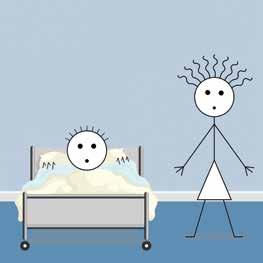
I DON’T WANT TO GO INTO SCHOOL TODAY
“I don’t want to go into school today, Mum, I don’t feel like ____________ today.
Oh, don’t make me ____________ to school today, Mum Oh, please let me stay ____________ and play.”
“But you must go to ____________, my cherub, my lamb, If you it will be a disaster, How would they manage without you, my ____________, After all you are the headmaster!”
(by Colin McNaughton)HELLO!
1 16 LISTEN AND READ • Ascolta e leggi il BLOG! di Andy.
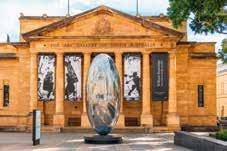
Did I tell you that I have a cousin in London? Her name’s Tara and she’s sixteen. She visited us last Christmas. When here it’s summer, in Europe it’s winter. It was Tara’s first time in Australia, and she travelled alone from London to Adelaide airport. She stayed for a couple of weeks, so we had plenty of time for sightseeing. We often went to Glenelg, a beautiful sandy beach near the city centre. We took a tram and spent whole days there swimming and sunbathing. We also enjoyed skateboarding with my friends in Playford Town skate park, the paradise of skateboarders. We went to the zoo (one of the oldest in Australia) where we saw exotic animals from all over the world and Australian species like kangaroos, koalas, emus, etc. We visited the Central Market with lots of things to eat from Australia and Asia.

Tara likes Art, so we went to AGSA (Art Gallery of South Australia) twice to see its famous Aboriginal art collections. And what about shopping? Rundle Mall is a pedestrian street full of department stores, boutiques, bookshops and much more!
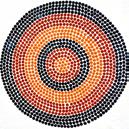

Aboriginal people have used dots in art for a very long time, both in sand painting and in body painting. In recent times Aboriginal painters have transferred this technique on paintings made with acrylic colours. Did you know?
Glossary
plenty of time molto tempo sightseeing giro turistico pedestrian pedonale dots puntini
2 READ AND WRITE • Leggi le frasi e dì se sono vere (T) o false (F). Poi correggi le frasi false.
1. Tara visited Adelaide when it was cold in London. T F
2. She travelled to Australia by plane. T F
3. It’s a long way from Adelaide to Glenelg beach. T F
4. Kangaroos and pandas are exotic animals in Australia. T F
5. You can see Aboriginal art at AGSA. T F
6. The Central Market is full of department stores. T F
3 WRITE • Where did Andy take Tara? Rispondi alla domanda sul quaderno.
1 READ AND MATCH • Abbina le parole alle immagini corrispondenti.
1. butcher’s
2. airport
3. café
4. baker’s
5. museum / gallery
6. port / harbour
7. library
8. bus station
9. shoe shop
10. bookshop
11. greengrocer’s
12. railway station
13. newsagent’s
14. chemist’s

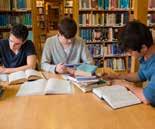



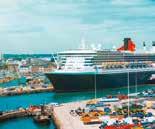




2 SPEAK AND WRITE • Dove si possono acquistare questi prodotti?
1. a kilo of onions: at the
2. a steak: at the
3. bus tickets: at the
4. some bread: at the
5. a pair of shoes: at the
6. medicines: at the 3 17 LISTEN AND WRITE • Ascolta questi minidialoghi. Dove si svolgono?




1 READ AND MATCH Tara ha scritto un breve resoconto del suo soggiorno in Australia per la sua insegnante di geografia. Leggi il testo e abbina ciascuna foto alla sua descrizione.

a. This road on the south-eastern coast of Australia is 240 km long. It attracts tourists because of its beautiful landscapes, like the Twelve Apostles, 12 high rocks rising out of the sea.
b. On the north-east coast, it is the largest area of coral of the world. You can go scuba-diving to see the different colours and shapes of corals and the various species of fish.
c. In this wide area there is the incredible Uluru monolith, a spiritual site for the Aborigines. It is a huge red rock (about 350 mt high) with a circumference of 9 kilometres.
d. Canberra is the capital but this is the most important commercial and tourist city. Its Opera House with its white sailshaped towers is a unique example of modern architecture.
Dear Mrs Collins,
As I promised, I’m sending you an attachment with a brief report of the places I visited in Australia. I stayed with my cousin’s family in Adelaide for the Christmas holidays and I had time to visit some wonderful places. Here are some photos and a short description for each picture.
See you soon at school!
Best wishes
Tara
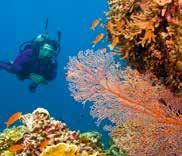


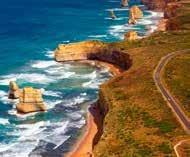
2 READ AND WRITE • Rileggi il testo e scrivi accanto a ciascuna frase in quale luogo andare.
1. you want to feel the spirit of Aboriginal culture?
2. you like swimming and scuba-diving?
3. you are interested in modern architecture?
4. you appreciate natural landscapes?
La forma interrogativa del Past Simple è uguale per tutte le persone, sia per i verbi regolari che per i verbi irregolari.
Forma interrogativa
DID + soggetto + verbo nella forma base + resto della frase
➜ Did you do the shopping? ➜ Did Helen like your present?
Short answers
Nelle short answers si usano DID nelle risposte affermative e DIDN’T nelle negative. ➜ Did Mary pass the English test? Yes, she did. / No, she didn’t. YES, I / YOU / HE / SHE / IT / WE / YOU / THEY DID. NO, DIDN’T.
Forma negativa
Anche la forma negativa del Past Simple è uguale per tutte le persone sia per i verbi regolari che per i verbi irregolari. SOGGETTO + DIDN’T + VERBO nella forma base + resto della frase ➜ Helen didn’t come to the party. ➜ We didn’t do the shopping.
1 Riscrivi su un foglio le seguenti frasi coniugandole al PAST SIMPLE in forma affermativa, interrogativa e negativa come nell’esempio.
Tom goes to school. Tom went to school. / Did Tom go to school? / Tom didn’t go to school.
1. Tara writes an e-mail.
2. Tim and Jo go to London on holiday.
3. The house is very old.
2 Trasforma in negative le seguenti frasi.
1. Tara saw the Great Barrier Reef.
2. Marco won a gold medal for high jump.
3. John used the phone on the airplane.
4. Brian was always late for school.
4. You often travel by plane.
5. We want to go shopping.
6. Jim works in a supermarket.
5. The kids sent us their photos.
6. Yesterday Ann left for the USA.
7. The students stopped talking.
8. Leo had his test yesterday.
3 Leggi le risposte e completa le domande usando il PAST SIMPLE.
1. Which dress Ann , the red or the blue one? She bought the red dress.
2. How you there? I got there by bus.
3. Where your friends after school? They went skateboarding.
4. When you at the station? I arrived at 4 p.m.
5. What film you ? I saw a science fiction film.
6. What time the film ? It started at 6.30 p.m.
Si usa per paragonare, per confrontare due persone, animali o cose.
➜ My brother is taller than me.
➜ Toys are more expensive than books.
Il secondo termine di paragone è introdotto da THAN.
➜ His scooter is older than my scooter.
Aggettivi di una sola sillaba o bisillabici che terminano in Y: aggettivo + -ER + THAN young ➜ younger (più giovane) lonely ➜ lonelier (più solo)
Aggettivi con più di due sillabe: MORE* + aggettivo + THAN
interesting ➜ more interesting (più interessante) difficult ➜ more difficult (più difficile) * Il significato di MORE è “più”.
Variazioni ortografiche
nice ➜ nicer (più simpatico) big ➜ bigger (più grande) busy ➜ busier (più occupato) windy ➜ windier (più ventoso)
Comparativi irregolari good ➜ better (migliore) bad ➜ worse (peggiore) Ricorda!
4 Confronta i due elementi e scrivi frasi con il comparativo e il verbo BE come nell’esempio.
Comics / interesting / school books Comics are more interesting than school books.
1. Sydney / big / and / important / Canberra?
2. This tablet / good / but / expensive / that tablet
3. You / good / me at drawing
4. Maths tests / easy / or / difficult / English tests?
5. Rap music / popular / classical music
5 Completa la conversazione tra questi due ragazzi scegliendo l’opzione corretta.
A. Kev, you and Tom (1) at the sports centre this afternoon.
B. No, I (2) to the skate park with him.
A. Yes, I (3) your photos. You’re one of the (4) skateboarders in your group.
B. Yeah, but Jim is (5) than me. He (6) first in last month's competition.
1. a. were b. weren’t
2. a. went b. ’m going
3. a. saw b. see
4. a. better b. best
5. a. more fast b. faster
6. a. is b. was


1 Risolvi gli indovinelli aiutandoti con i suggerimenti.
a. We go through cities, towns and villages, but never come inside. What are we?
Anagram this word:
E S R T T S E
c. Every day trains travel from one town to another, always on the same track, going nonstop at the same speed. The 12 o'clock train took 80 minutes to complete the trip, but the 4 p.m. train took an hour and 20 minutes. Why?
Think of the verb ride, rode, ridden.
b. A man rode into town on Tuesday and left two days later on Tuesday. How so?
2 18 • Ascolta e completa il testo della poesia.
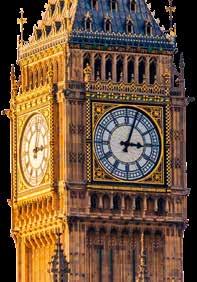
Did you know?
Big Ben is one of London's most popular landmarks. 'Big Ben' does not refer to the clock tower (called Elizabeth Tower in 2021). It actually refers to the big bell inside it together with five smaller bells.
Different things can be the same from a different point of view…
At rest inside the golden , a giant awaits the hour. Tick-TOCK, tick-TOCK. The clock marks Ding-DONG, ding-DONG. The small bells chime Then, at the , a hammer pounds. The bell lets loose with wondrous that ring and echo, loud and . The song of Big Ben -BONG! BONG! BONG!
chime risuonano
a hammer pounds un martello batte lets loose si scatena wondrous meravigliosi
(by Patricia Toht, All aboard the London Bus)
ring and echo risuonano e fanno eco landmarks punti di riferimento